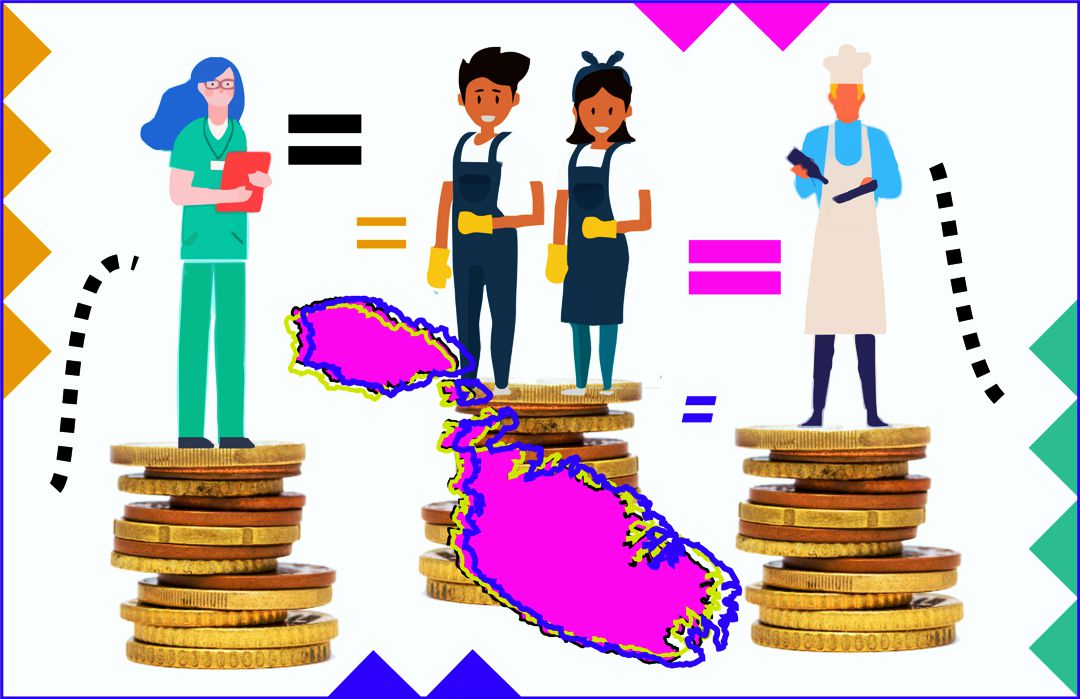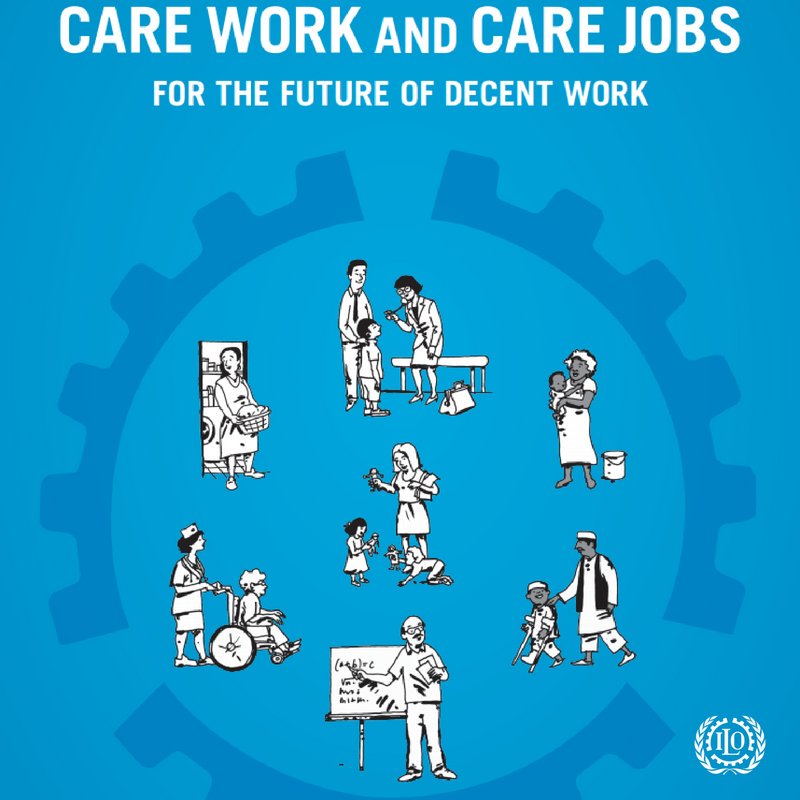
Democratic economic policies like job guarantee schemes and a universal basic income could address two key issues at once—clientelism and economic precarity.
by Nicole Meilak
Collage by the IotL Magazine
[dropcap]B[/dropcap]etween SARS-CoV-2 and the political crisis from late last year, the population of Malta was confronted with grievous issues that are not only intrinsic to the global neoliberal economic model in general, but also to our political and economic structures in Malta.
The political crisis put a blinding spotlight on clientelism and corruption, while the pandemic has left many without a job or a secure source of income. Marginalized communities like the residents of the Ħal Far Open Centre, as well as those in lower-income jobs who cannot work from home due to the nature of their job—such as, for instance, the hospitality sector—are disproportionately affected by the quarantine measures. Workers in other low-paid jobs, be they cashiers or delivery drivers, face a greater risk of becoming infected.
Both crises have revealed the precariousness on which the Maltese economy functions. Democratic economic policies like job guarantee schemes and a universal basic income could come to the rescue: they could address two key issues at once—clientelism and economic precarity.
Clientelism and Personal Loyalty to Politicians
During the political crisis, the conspicuous absence of the core Labour party supporters at the predominantly middle class protests demanding immediate resignations of Joseph Muscat and his close friends under investigations was paramount to the crisis’ outcome. Clientelism is one of the factors that effectively prevents many citizens from holding authorities accountable, thus undermining democratic processes.
While not a new concept in our political jargon, clientelism has always been the elephant in the room in Maltese politics. Clientelism is both a political strategy as well as an outcome of our district-based electoral system, which facilitates patron-client relationships between politicians and voters, resulting in a trade-off of political favours.
The personal relationship that clientelism breeds is inherently individualistic, allowing for large private benefits but offers nothing to the common good.
Personal relationships between politicians and constituents are not inherently bad, and are almost unavoidable in Malta. The small size of the archipelago and its close-knit networks mean that we form multi-faceted relationships, and our roles in society often overlap. A politician is not just a politician—they are likely to be our neighbours, work colleagues, mentors and lecturers. This makes maintaining impersonal relationships far more difficult than in larger countries, and makes political favours much easier to carry out.
Clientelism involves a special relationship between a voter and a politician, where the voter is comfortable enough to ask for work or income-related help, and the politician has the power to offer this help—but this is an exclusionary process. Not everyone is able to form close networks with politicians, especially those in marginalized communities who are often most in need of economic help. The personal relationship that clientelism breeds is inherently individualistic, allowing for large private benefits but offers nothing to the common good.

The issue with clientelism is not the provision of a job or financial aid. Everyone has the right to stable income, and if someone is struggling to get by, there is no harm in receiving financial benefits. The problem lies in the fact that it excludes those people in society who cannot benefit from close political contacts. It ignores the working people in society who miss out on public sector job opportunities because they do not have the right contacts, and it leaves out those on the margins of society who are unable to find work and are often left out of the political process altogether.
Clientelism fosters inequality and nepotism, and only works to favour a small section of the population—but a job guarantee or a Universal Basic Income (UBI) could help solve this.
Ultimately, clientelism fosters inequality and nepotism, and only works to favour a small section of the population—but a job guarantee or a Universal Basic Income (UBI) could help solve this.
Job Guarantee, Universal Basic Income and Economic Security
A job guarantee is an economic policy that allows the public sector to offer jobs to anyone who is willing and able to work. Under a job guarantee, the state becomes an ‘employer of last resort’, meaning that anyone who cannot find work elsewhere can be hired by the state to work in a fixed-wage job of public benefit, regardless of their previous experience or technical abilities. On a micro level, it guarantees work to those who are under—or unemployed and are looking for alternative work. This not only helps alleviate poverty and social exclusion, but also draws on a person’s right to work.
On a more technical macro level, a job guarantee acts as an automatic stabilizer, meaning that it keeps inflation steady while the economy fluctuates.
Under a job guarantee, the state becomes an ‘employer of last resort’, meaning that anyone who cannot find work elsewhere can be hired by the state to work in a fixed-wage job of public benefit.
If the economy is doing poorly, with high levels of unemployment, the public sector is able to hire those unemployed people and provide a boost to GDP by increasing public sector spending on job guarantee wages and providing income to those in society who would otherwise have none. On the other hand, an economic boom allows people to find better paying jobs in the private sector, and further decreases public sector spending on the job guarantee program.

As Abigail Muscat notes, “jobs provision needs to be compatible with social and ecological targets, such as caring for children and the elderly, as well as restoring habitats and nature reserves.” Like in most European Union (EU) countries, Malta’s population is aging and this is expected to worsen in the coming years. In this regard, ‘care work’—nursing, teaching, looking after people with disabilities and elderly people—could be the ideal candidate for job guarantee schemes.
One of the most significant aspects revealed by the pandemic was that the labour of care workers, nurses, supermarket employees and cleaners sustains society. These jobs are essential to the functioning of every society, yet they are also among the least valued and poorly remunerated. The majority of these jobs are occupied by women.
One of the most significant aspects revealed by the pandemic was that the labour of care workers, nurses, supermarket employees and cleaners sustains society.
Combined with a decent pay and societal respect, guaranteed jobs in the care sector could transform society and make the so-called ‘care economy’ a reality. This could also ensure gender equality, provide a better work-life balance, let us cope with ageing populations and, finally, break away from GDP growth as an economic metric, thus offering an ecologically sustainable economic model.
UBI is a separate economic policy that sees the government making regular, periodic payments to all individuals regardless of their economic status. This acts as a safety net for those who are unable to work or who wish not to work, allowing them the peace of mind that they will not fall into poverty during this period of time.
A UBI can provide workers with more bargaining power—companies will have to provide competitive wages and employee benefits to encourage people to work for them as opposed to remaining unemployed. This policy also empowers women who devote their time to unpaid care or house work, allowing them compensation for such essential care services.
The ultimate benefit of the UBI is that it liberates workers from wage slavery, providing countless opportunities for people to engage in what they are passionate about without worrying about earning a high enough wage or falling into poverty.
The ultimate benefit of the UBI is that it liberates workers from wage slavery, providing countless opportunities for people to engage in what they are passionate about.
Policies like these will have to be carefully designed in order to be efficient.
Under a job guarantee, the wage offered by the state will effectively become the new minimum wage. If you are guaranteed a job at 6 Euro an hour under the job guarantee, there is little benefit in opting for a job that offers 4.50 Euro an hour.
Companies will have to ensure that their wages are high enough to encourage people to work in the private sector as opposed to the public sector, but since this increases labour costs, the state has to implement a wage that is high enough so that it encourages public sector participation, but not too high that it “crowds out” the private sector. The same applies for a UBI—the basic income needs to be high enough so that people do not fall into poverty, but it cannot be so high that it discourages people from entering employment in the first place—and will thus have to be lower than the minimum wage.
A UBI that would entail monthly payments of 850 Euros to working age adults (from 16 till retirement age), 950 Euros to pensioners and disadvantaged individuals and 200 Euros to children would cost between 4.5 and 5 billion Euros annually, which represents approximately 40% of Malta’s current GDP. Therefore, such a UBI is not an unrealistic vision.
Job Guarantee and UBI: a Break Away from Clientelism
Apart from the aforementioned advantages, another major benefit of these policies in the Maltese context is the way they could reshape our dependence on clientelistic behaviour.
A job guarantee or UBI tackles clientelism by making sure that people are in a safe economic position, meaning they do not need extra economic help from politicians in the first place. In contrast to moralistic sentiments which suggest that benefactors of patronage must instead become self-sufficient in the conditions of market competition, these policies provide financial security and eliminate the need to bargain for a source of income in exchange for personal and partisan loyalty.
A job guarantee or UBI provide financial security and eliminate the need to bargain for a source of income in exchange for personal and partisan loyalty.
Once bargaining for favours is out of the equation, an individual is no longer obliged to provide political support to their patrons in power.
These policies further solve the exclusionary aspect of clientelism—with a job guarantee or UBI, anyone can benefit from a public sector job or financial aid, regardless of political contacts and socioeconomic status.
Most importantly, a job guarantee and UBI allow us to transform the way we view ourselves in relation to our work. In today’s economy, we work to live, but a job guarantee and UBI grant us freedom to find fulfilling work and the freedom to pursue interests outside of work that might not be considered financially viable—empowering us socially and strengthening us economically.

Leave a Reply